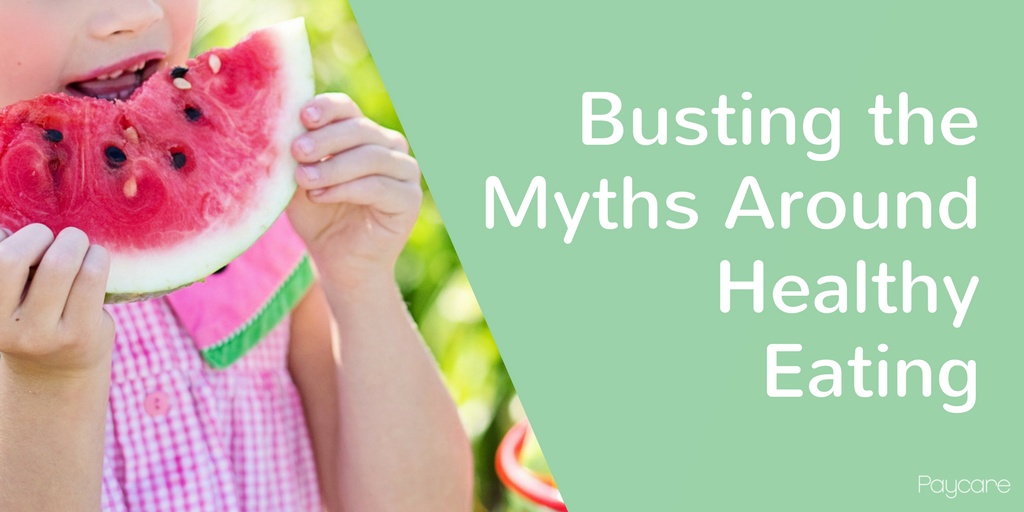With ‘healthy’ foods on the agenda even more than ever, we look at myth-busting the latest fads and look at what’s truly healthy for us…
Thanks to celebrity endorsements, supermarket paleo products, and ‘research’ consistently challenging the way we think about the foods we consider to be good, it can feel like we’re being faced with an information-overload when it comes to healthy eating.
Whether we’re looking at diets to lose weight, to gain muscle and tone up, or to maintain more healthy and balanced eating habits, there are many options to choose from. Equipped with our imaginary detective hat, we take a look at what’s fact, and what’s plain fiction…
Myth 1 | The fewer the carbs, the healthier you are
Too many carbohydrates can affect our health, especially if we’re sedentary much of the time. But consuming them doesn’t mean you’re unhealthy. In fact, healthy carbohydrates such as whole grain can be good for you. At least seven major studies show that people who eat whole grains have 20-30% less chance of heart disease.
Fact: complex carbohydrates can assist weight loss through the thyroid gland function where carbs are needed for energy levels.
Myth 2 | You shouldn’t eat late at night
A calorie is a calorie at any time of the day. Eating late or just before you go to sleep means that burning the calories off will be harder than in the day when you’re more active, but it depends on what you choose to eat. A large bag of chocolate or sweeties isn’t as healthy as toast with natural peanut butter for example, but it doesn’t mean you shouldn’t have a treat if you fancy it. Everything in moderation!
Myth 3 | Microwaving Removes Nutrients from Food
Using the microwave hasn’t been proven to make food any less nutritious – it’s actually the level of heat used and the length of time it is cooked, rather than the cooking method itself. In a 2015 Food Chemistry study1, it was found that microwaving contributed to an increased antioxidant level in broccoli and cauliflower, suggesting it might actually be better for you than boiling them in water!
Myth 4 | Eating Fat Makes You Fat
While fat has more calories per gram than carbs or protein, it’s essential to maintain a healthy, balanced diet, and it aids in the body’s overall function. Calorie surplus, which can come from any food group, can contribute to weight gain. Healthy fats are found in foods such as salmon, avocado and walnuts, and can help to kick junk food cravings and keep us feeling fuller for longer.
Fact: in some cases, healthy fats can promote cardiovascular health and reduce the risk of heart disease.
Myth 5 | Frozen Fruit & Veg Contains Less Nutrients
Fruits and vegetables are usually frozen six to ten hours after being picked, and therefore can ‘lock’ in all of the vitamins and minerals they provide, while fresh fruit and veg can travel quite a distance before being stored in shop, bought, and eventually eaten.
Fact: out of season fruit and vegetables are often not as healthy as frozen equivalents – just watch out for any added salt or sugar!
Myth 6 | Fat-Free & Low-Fat Is Better
Numerous studies have shown that while fat-free and low-fat products can be shown to aid weight loss, they can be worse for your health. The reason is that while the fat has been removed or reduced, the taste is compensated by replacing the fat with worse alternatives such as sugar and salt. Most nutrition experts believe you’re actually better off avoiding artificially fat-free and low-fat foods and opting for whole foods with healthy fats, such as nuts.
How We’re Busting Our Own Myths
At Paycare, we are always exploring ideas and team-focused activities that we can take part in to enhance our overall health and wellbeing. And we recognise that having a healthy mind and body can be helped massively by how we nourish ourselves, which is why we’ve recently been working with Mel Wakeman, a renowned expert in the field of food, nutrition and health. She’s been helping to raise our awareness and knowledge of nutrition, identifying areas where we can individually make enhancements to our diets, and supporting us to become even better versions of ourselves.
It’s been an incredible activity to be part of and many of us have already noticed an improvement in our mood, energy levels and motivation both in the office and at home!
Are there are any myths that you’d like to bust? Feel free to join the conversation on Twitter, you can find us at @MyPaycare.
1 | International Journal of Gastronomy and Food Science | https://www.sciencedirect.com/science/article/pii/S1878450X15000207

